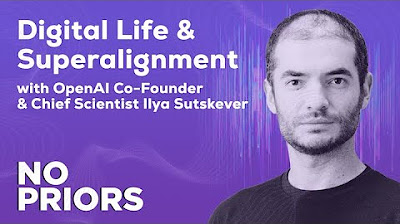Ilya Sutskever (OpenAI Chief Scientist) - Building AGI, Alignment, Spies, Microsoft, & Enlightenment
Summary
TLDR在这次激动人心的采访中,OpenAI的联合创始人兼首席科学家Ilya Sutskever深入探讨了他在人工智能领域取得多项重大突破的背后动力和方法。他强调了持续的努力、对未来的愿景以及与可靠性和可控性挑战的斗争。Ilya对当前人工智能的经济价值、潜在的滥用风险、以及朝着人工通用智能(AGI)迈进的路上可能出现的发展窗口进行了深刻见解。此外,他还讨论了对未来的展望,包括人工智能在社会中的作用、与人类智能的比较,以及他对科技与人类未来共生的思考。
Takeaways
- 😀 伊利亚·苏茨克弗表示,他能在AI领域取得多个突破的原因是极其努力和全力以赴。
- 🤖 针对GPT潜在的不法使用,苏茨克弗认为这些风险现实存在,预计将来会有更多此类事件发生。
- 🔍 在大规模追踪非法使用GPT方面,苏茨克弗认为这是可能的,需要特别的操作来实现。
- 💡 苏茨克弗认为AI产业在达到通用人工智能(AGI)之前将经历多年的经济增值期。
- 🚀 对于AI的经济影响,苏茨克弗预计将有显著增长,但具体的GDP占比难以精确预测。
- 🤔 在讨论AI的可靠性问题时,苏茨克弗表示如果AI的可靠性不达标,将严重限制其经济价值。
- 🌐 在讨论AI发展的下一步时,苏茨克弗认为现有的生成模型方法将会带来巨大进步,但可能还不是达到AGI的最终形态。
- ✨ 苏茨克弗对AI进行强化学习的趋势表达了乐观态度,尤其是在自动化和与AI合作方面。
- 🔧 关于AI硬件的讨论中,苏茨克弗表示现有硬件已足够支持当前的AI研究和应用。
- 📊 苏茨克弗强调AI对世界的深远影响,认为人类可能需要与AI合作,以理解和解决未来的复杂问题。
Q & A
伊利亚·苏茨克沃表示,为什么他能在其领域取得多次重大突破?
-他表示,这是因为他非常努力,全力以赴,这一方法迄今为止有效。
为什么目前还没有更多非法使用GPT的情况出现?
-伊利亚认为,可能是因为还没有大规模地使用这项技术进行非法活动,但他也不排除这种情况正在发生。
人工智能在达到AGI之前的经济价值窗口有多大?
-伊利亚认为,这是一个好几年的时间窗口,因为人工智能在成为AGI之前的价值会以指数方式年复一年地增加。
为什么在2030年人工智能对GDP的贡献百分比难以预测?
-因为伊利亚认为他的误差范围是对数级的,可以想象一个巨大的百分比,也可以想象一个令人失望的小百分比。
如果2030年人工智能经济价值较小,伊利亚认为最可能的原因是什么?
-如果真的发生这种情况,伊利亚认为最可能的原因是可靠性问题,即人们需要不断检查人工智能的答案,这限制了其经济价值。
未来是否有可能完全不需要人类干预就能进行人工智能的增强学习?
-伊利亚认为,确实有可能实现这一点,未来的模型可能主要依赖于人工智能自我学习,而不是依赖于人类的直接干预。
为什么人工智能在进行多步骤推理时看似表现不佳?
-伊利亚解释说,人工智能在不允许“大声思考”时在多步骤推理方面似乎表现不佳,但允许它们这样做时,它们表现得相当好。
伊利亚如何看待人工智能对数据需求可能达到极限的情况?
-他认为,虽然目前数据情况还不错,但未来某一天数据会耗尽,届时需要寻找其他方式来训练模型,提高其能力。
伊利亚认为,在人工智能研究中哪种方向最有希望?
-他认为,将来可能需要将过去的所有不同想法整合在一起,而不是仅依赖当前的某个特定范式。
在谈到未来人工智能的发展时,伊利亚是否认为当前的硬件是一个限制因素?
-伊利亚认为,当前的硬件并不是限制因素,虽然他希望硬件成本更低,但总体上硬件对于人工智能的发展并不构成障碍。
Outlines

This section is available to paid users only. Please upgrade to access this part.
Upgrade NowMindmap

This section is available to paid users only. Please upgrade to access this part.
Upgrade NowKeywords

This section is available to paid users only. Please upgrade to access this part.
Upgrade NowHighlights

This section is available to paid users only. Please upgrade to access this part.
Upgrade NowTranscripts

This section is available to paid users only. Please upgrade to access this part.
Upgrade NowBrowse More Related Video

Ilya Sutskever: Deep Learning | Lex Fridman Podcast #94

Interview with Dr. Ilya Sutskever, co-founder of OPEN AI - at the Open University studios - English

Inside OpenAI [Entire Talk]

No Priors Ep. 39 | With OpenAI Co-Founder & Chief Scientist Ilya Sutskever

3. Cognitive Architectures

Ilya sutskever | Humanity will eventually move towards AGI | The intelligent body will soon appear
5.0 / 5 (0 votes)
